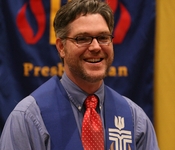Landon Whitsitt. Open Source Gospel: Ten Commandments for the Future of the Christian Faith. E-book, 2010. Available online at http://landonwhitsitt.com/open-source-gospel/
Landon Whitsitt is an ordained Presbyterian (PCUSA) pastor who serves as the pastor of First Presbyterian Church in Liberty, Missouri, and as the Vice-Moderator of the General Assembly of the Presbyterian Church (USA), which is the second highest elected official in the 2.3 million member denomination. He has been active with Presbymergent, the Presbyterian Church (U.S.A.) ecumenical-interfaith network, and has served on the PC(USA) Committee on Theological Education. Whitsitt also serves as co-host of God Complex Radio, which is a weekly podcast led by young Christian leaders who are “determined to lead Christianity into the 21st century and translate the values of the Christian faith to the next generation.” His first book, Open Source Church: Tapping into the Wisdom of the Priesthood of All Believers, will be published later this year. Open Source Gospel: Ten Commandments for the Future of the Christian Faith (2010) is available as a free e-book.
Background
According to the U.S. Congregational Life Survey, research conducted by the PC(USA) Research Services office in 2008 and 2009, the “median age of PC(USA) worshipers is 61.” The denomination’s membership has been in decline for decades and recently several key leaders declared the denomination “deathly ill.”
As a thirty-something, Bruce Reyes-Chow became known well beyond the denomination for his effective use of new media while serving as the denomination’s most recent past moderator. At 34 years of age, Whitsitt has continued to use these tools to work for reform within the denomination, including but not limited to nFOG. Appropriately, Whitsitt has leveraged new media as a conduit for sharing his views and reforming his denomination. If the medium is the message, as McLuhan proclaimed, then Open Source Gospel is a success in communicating an important message for the early twenty-first century church.
Book Basics
Open Source Gospel is non-sectarian, postmodern, and practical. It is an important read for those who are concerned with reversing the decline in the mainline and for those who are committed to Christian unity.
Open Source Gospel: Ten Commandments for the Future of the Christian Faith‘s stated purpose is providing “a fresh look at the message of the Gospel by using the specific principles of the open source movement” (p.8). Building on the work of Bruce Perens’ and Open Source Definition or OSD (p.13-14), Whitsitt adapts the ten OSD guidelines into Ten Commandments of an Open Source Christianity:
- thou shalt freely give what thou hast freely received
- thou shalt not restrict access to jesus christ, the word of god
- thou shalt celebrate the incarnation by celebrating contextualization
- thou shalt respect the integrity of the person and work of jesus christ
- thou shalt not exclude any person or group
- thou shalt not exclude any mission or ministry
- thou shalt extend the benefits of the gospel to all
- thou shalt not restrict the benefits of the gospel to a particular theology
- thou shalt not deny the truth and benefits of other religious traditions
- thou shalt not restrict the benefits of the gospel to a particular group
So What?
“The totality of the Gospel will never be found in a particular, contextualized expression of it” (p.43).
- What is your initial response to the idea of viewing the Gospel as open source?
- How might a systemic shift toward this view impact existing mainline denominational structures in ways that will extend beyond current proposals, such as nFOG for the PCUSA or UGov in the UCC?
- Do you think the idea of an “open source” Gospel could be helpful not only for uniting those within the mainline, but also the mainline denominations with denominations affiliated with the Evangelical tradition or other more theologically conservative fellowships? Why or why not?
I appreciate the ongoing conversation and trust that we all benefit from listening to the many voices and adding our own. My recent post, Moving the Mainline Forward, offers numerous links to some of the voices I have interacted with here at sowhatfaith.com in recent months.
